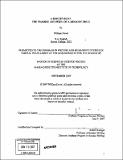| dc.contributor.advisor | Robert Kanigel. | en_US |
| dc.contributor.author | Dowd, William (William Michael) | en_US |
| dc.contributor.other | Massachusetts Institute of Technology. Graduate Program in Science Writing. | en_US |
| dc.date.accessioned | 2008-09-03T14:43:25Z | |
| dc.date.available | 2008-09-03T14:43:25Z | |
| dc.date.copyright | 2007 | en_US |
| dc.date.issued | 2007 | en_US |
| dc.identifier.uri | http://hdl.handle.net/1721.1/42146 | |
| dc.description | Thesis (S.M. in Science Writing)--Massachusetts Institute of Technology, Dept. of Humanities, Graduate Program in Science Writing, 2007. | en_US |
| dc.description | Includes bibliographical references (leaves 49-51). | en_US |
| dc.description.abstract | In the MIT lab of neuropharmacologist Richard Wurtman, rodents that received a new Alzheimer's drug have shown a marked improvement in learning and memory. They are able to master elaborate mazes in half the time of their all-natural counterparts. Wurtman theorizes that the memory loss and dementia associated with Alzheimer's disease is caused not by amyloid plaques and tangles but by a gradual deterioration of the brain's synapses. Wurtman's drug-a cocktail of three dietary supplements including uridine, choline, and an omega-3 fatty acid called DHA-is designed to generate more synapses. The three ingredients deliver the stimulus and raw material needed to create more phosphatidylcholine, a major component of neuronal membrane. More membrane, the thinking goes, means more neuronal encounters, more synapses, and more relayed messages. Wurtman's cocktail has just entered a massive clinical trial involving 10,000 Alzheimer's patients spread across 10 European countries. The same drug that could preserve brain function in Alzheimer's patients also has potential as a memory drug for healthy people. This thesis explores the ethical questions surrounding such biotechnological enhancement. What might be the benefits and drawbacks of taking a memory booster? Could a class-like division eventually arise between those who get the drug and those who do not? Could the molecular manipulations of a smart drug-what some call "cosmetic pharmacology"--change qualities that are inextricable from who we are? | en_US |
| dc.description.statementofresponsibility | by William Dowd. | en_US |
| dc.format.extent | 51 leaves | en_US |
| dc.language.iso | eng | en_US |
| dc.publisher | Massachusetts Institute of Technology | en_US |
| dc.rights | M.I.T. theses are protected by
copyright. They may be viewed from this source for any purpose, but
reproduction or distribution in any format is prohibited without written
permission. See provided URL for inquiries about permission. | en_US |
| dc.rights.uri | http://dspace.mit.edu/handle/1721.1/7582 | en_US |
| dc.subject | Graduate Program in Science Writing. | en_US |
| dc.title | A bright idea? : the promise and peril of a memory drug | en_US |
| dc.title.alternative | Promise and peril of a memory drug | en_US |
| dc.type | Thesis | en_US |
| dc.description.degree | S.M.in Science Writing | en_US |
| dc.contributor.department | Massachusetts Institute of Technology. Graduate Program in Science Writing | en_US |
| dc.contributor.department | MIT Program in Writing & Humanistic Studies | |
| dc.identifier.oclc | 228414126 | en_US |
